[Translation][Spanish] Node.js (1047 words) (Part 48)
Project Details
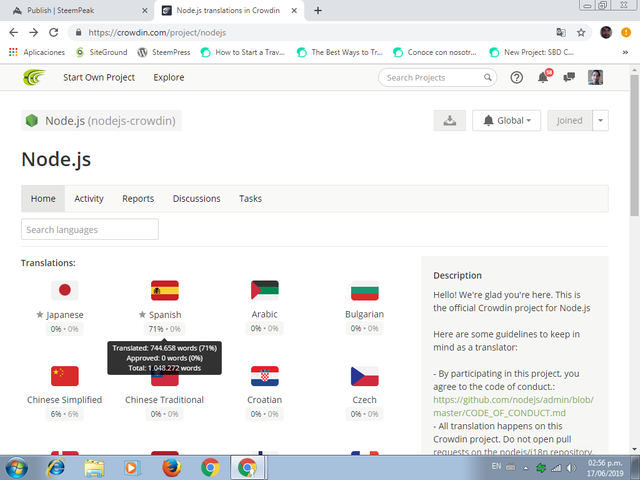
Node.js is an open-source, cross-platform JavaScript run-time environment that executes JavaScript code outside the browser.
Node.js brings event-driven programming to web servers, enabling development of fast web servers in JavaScript. Developers can create highly scalable servers without using threading, by using a simplified model of event-driven programming that uses callbacks to signal the completion of a task. Node.js connects the ease of a scripting language (JavaScript) with the power of Unix network programming.
In easier to understand words: Node-js is a free platform whose goal is to provide its users the possibility to create lightweight and cost efficient web servers, how does Node.js do this?
Node.js handles web server connections in a way so they don´t take up as much space in a server, and thus, the owner of a project would not need to invest as much money in multiple servers to store so much information in Gigabytes.
Being an Open Source Project, Node.js possesses immense value for providing so much while at the same time being totally free.
Contribution Specifications
744,658 words have been translated so far in the Spanish translation folder of Node.js, which amounts to a total of 71% done in regards to the completion of the translation of this big project.
Translation Overview
In this contribution, I finished translating the third url.md folder of Node.js.
URL stands for Uniform Resource Locator, colloquially termed a web address. It is a reference to a web resource that specifies its location on a computer network and a mechanism for retrieving it.
Uniform Resource Locators were defined in 1994 by Tim Berners-Lee, the inventor of the World Wide Web.
The format combines the pre-existing system of domain names (created in 1985) with file path syntax, where slashes are used to separate directory and filenames. Conventions already existed where server names could be prefixed to complete file paths, preceded by a double slash (//).
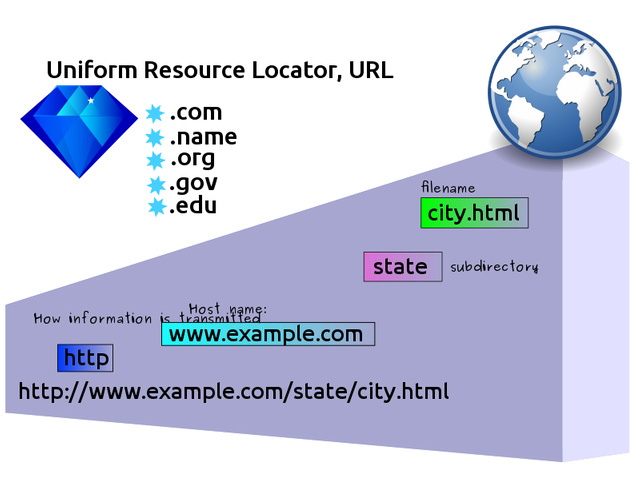
In this contribution (just like in my previous one), I took a different approach and translated this folder in order, following the sequence of the information:
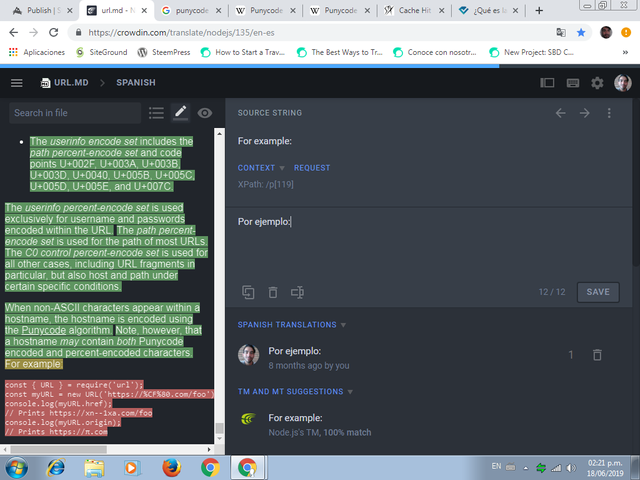
Here in the last image you can see that the green text is made up of strings that have already been translated, I decided to translate the strings of this folder in order this time.
The contents found in this folder have all been translated and properly proofread.
This time, the concepts that showed the most relevance were Punycode and Cache.
These are some examples of strings that show these words:
1 . PUNYCODE
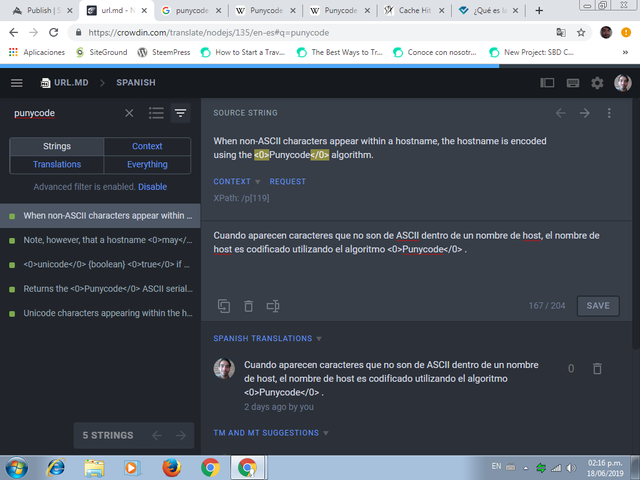
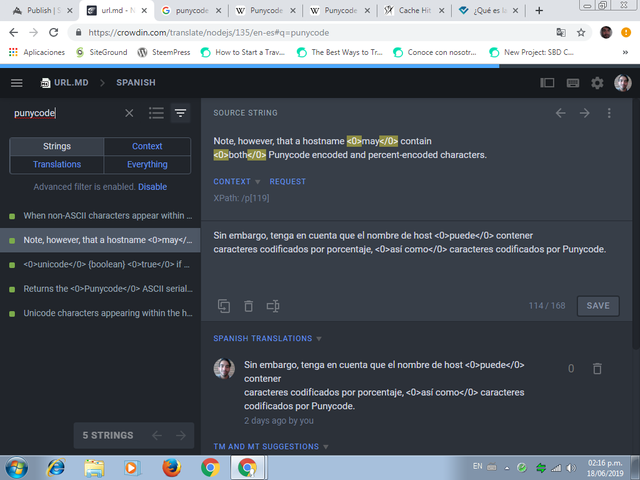
2 . CACHE
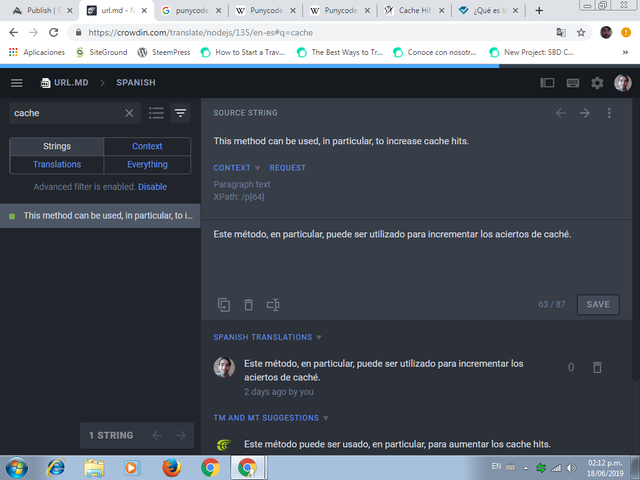
Those are the new words I found on url.md.
These are the meanings of the concepts I learned about while working on this contribution:
Punycode:
The Punycode is a codification syntax used in programming that uses a Unicode string that can be translated to a more limited character string, one that is compatible with network names. The syntax is published on the internet in the RFC 3492 document.
The coding is used as part of the IDN, which is a system that enables IDN usage (IDN stands for Internationalized Domain Name) in all of the scripts supported by Unicode.
Punycode is designed to work with every script and to be self-sufficient in the optimization of trying to adapt itself to the various characters in the set of the string that it operates.
The following image furthers the explanation of the word:
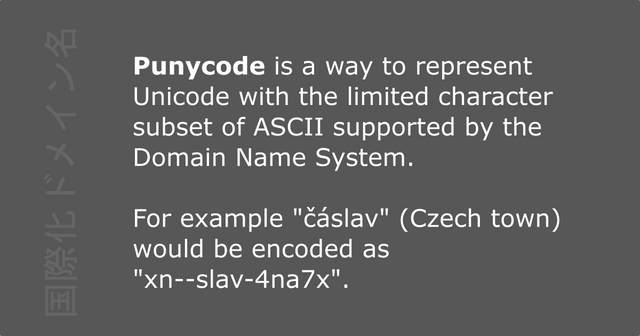
Cache:
The word Cache means: a type of auxiliary memory that can be retrieved at a high velocity, with a relatively small storage capacity.
It is located within the Central Processing Unit and the Computer Memory. It helps to avoid accessing the hard drive. It also helps to avoid complex recalculations by temporarily storing certain data, making them readily available whenever necessary.

The Cache stores a copy of the actual request and in a sense reveals the contents of the requested element.
To allow a more efficient access, the parts of the program that receive the most use as well as the calculated data are stored within the Cache, and because of it, they become more easily available. The Cache acts as a buffer between the computer memory and the hard drive, allowing certain strings to be handled more efficiently.

Total of words translated on my previous contribution, on the third url.md subfolder
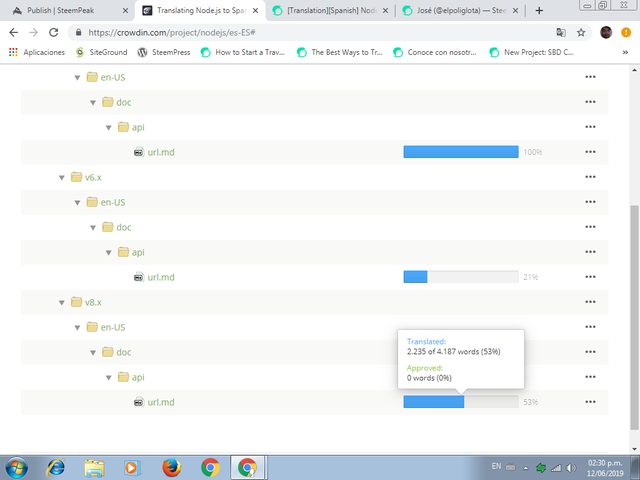
Total of words translated on this contribution, on the third url.md subfolder
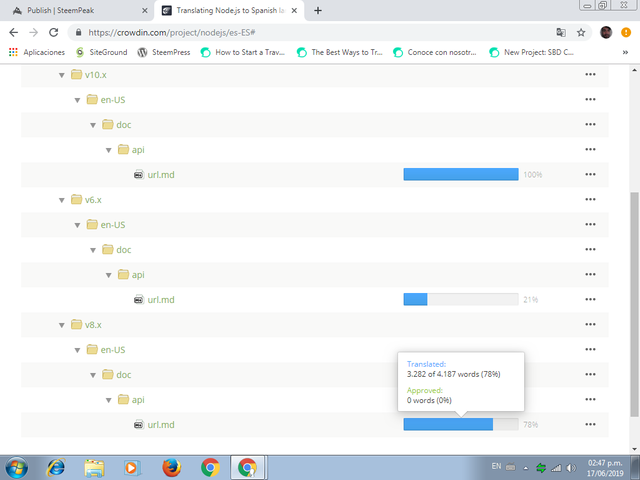
Here's the link to the url.md folder.
DISCLAIMER: Even though the translation of this folder is complete, you can see that in the last image in which the translated word count is shown there are about 800-900 words that were not translated, this is because those strings contain code that cannot be changed or translated.
Languages
The project's source language is English and it is being translated into Spanish.
Also, Node.js is currently being translated into other 32 languages. I´m contributing to making this project accessible to the Spanish speaking community online.
Besides collaborating as a translator for Open Source Projects on Crowdin I also work as a Freelance Translator for a law firm in the US, I've been working for that company for one year and six months, translating sworn statements and legal documents from English to Spanish and viceversa.
Open Source Projects I've worked on and contributed to as a translator:
5 . Node.js
Word Count
Part 1: 1016; Part 2: 1026; Part 3: 1035; Part 4: 1092; Part 5: 1050; Part 6: 1147; Part 7: 1133; Part 8: 1049; Part 9: 1090; Part 10: 1093; Part 11: 1024; Part 12: 1102; Part 13: 1085; Part 14: 1049; Part 15: 1035; Part 16: 1059; Part 17: 1041; Part 18: 1114; Part 19: 1114; Part 20: 1033; Part 21: 1030; Part 22: 1059; Part 23: 1047; Part 24: 1070; Part 25: 1151; Part 26: 1039; Part 27: 1025; Part 28: 1035; Part 29: 1063; Part 30: 1037; Part 31: 1047; Part 32: 1023; Part 33: 1041; Part 34: 1064; Part 35: 1060; Part 36: 1052; Part 37: 1055; Part 38: 1064; Part 39: 1066; Part 40: 1071; Part 41: 1051; Part 42: 1058; Part 43: 1053; Part 44: 1057; Part 45: 1058; Part 46: 1066; Part 47: 1054; Part 48: 1047.
Total of words translated so far: 50867.
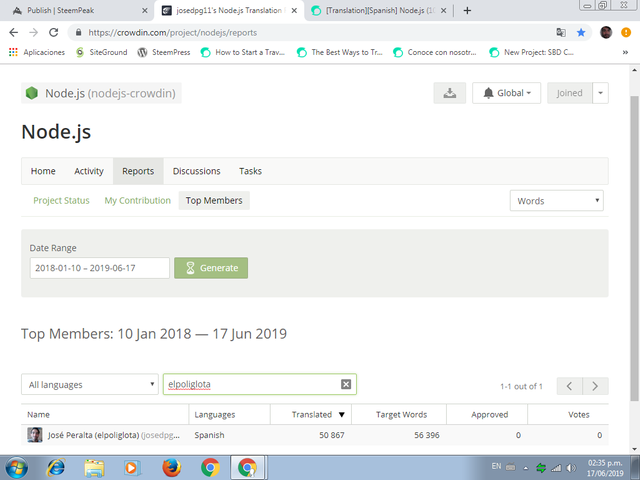
Proof of Authorship
This translation contribution was submitted via Crowdin on June 15 and June 16.
For further Proof of Authorship in regards to this contribution you can see my activity on Crowdin here.
Greetings @elpoliglota,
Thank you for submitting your contribution!
Node.js is a very interesting project that contains many code values and terms related to computer science. Its difficulty relies on the fact that we must pay a lot of attention to the code in order to deliver the most accurate translation possible.
You did a very good job with your presentation post, it explains the purpose of the text you translated in a clear and precise way. You also included useful concepts you learned while working on this contribution, as well as examples.
Your translation is accurate, as you have adapted to the project's terminology. The vocabulary you used is correct and appropriate for the Spanish language, as well for the project.
Keep up the good work! :)
Your contribution has been evaluated according to Utopian policies and guidelines, as well as a predefined set of questions pertaining to the category.
To view those questions and the relevant answers related to your post, click here.
Chat with us on Discord
Thank you for your review, @marugy99! Keep up the good work!
Hi @elpoliglota!
Your post was upvoted by @steem-ua, new Steem dApp, using UserAuthority for algorithmic post curation!
Your post is eligible for our upvote, thanks to our collaboration with @utopian-io!
Feel free to join our @steem-ua Discord server
Hey, @elpoliglota!
Thanks for contributing on Utopian.
We’re already looking forward to your next contribution!
Get higher incentives and support Utopian.io!
Simply set @utopian.pay as a 5% (or higher) payout beneficiary on your contribution post (via SteemPlus or Steeditor).
Want to chat? Join us on Discord https://discord.gg/h52nFrV.
Vote for Utopian Witness!